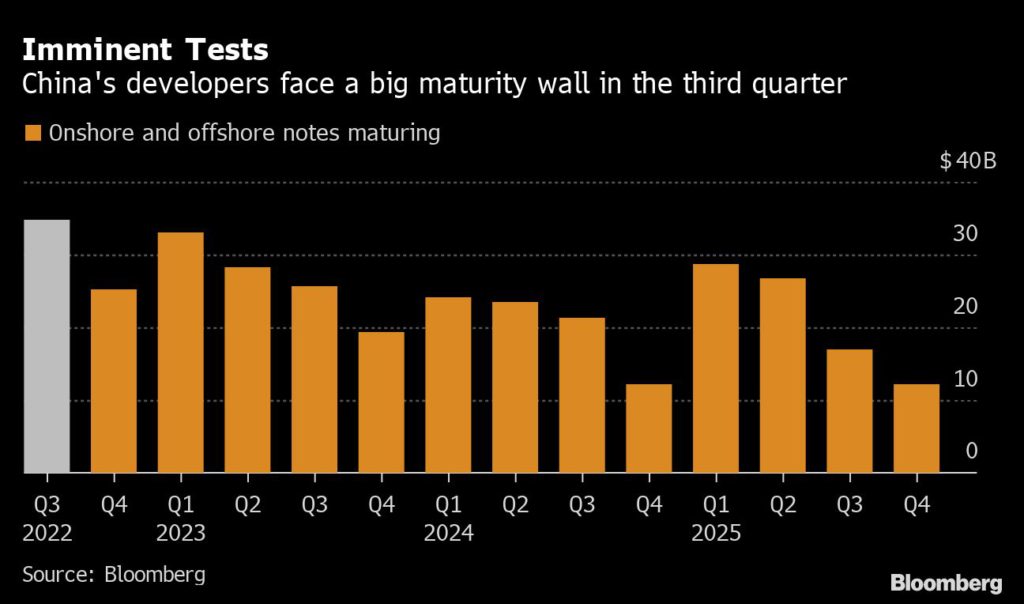(Bloomberg) — China’s stop-start reopening may be too little, too late to save some cash-strapped property developers.
Among 32 builders that have defaulted since the start of last year or are currently facing debt-repayment pressure, at least 13 have derived more than a third of their sales from the Yangtze River Delta area anchored by Shanghai, according to Bloomberg calculations based on company data. The manufacturing heartland has started emerging from crippling lockdowns imposed as part of the country’s Covid Zero policy following a surge of infections.
“The lifting of the lockdowns won’t necessarily provide an imminent relief to developers that have traditionally invested in the region,” said Amy Kam, a senior portfolio manager at Aviva Investors Global Services Ltd. “Unless funding channels are reopened, many private developers will continue to struggle to pay down debts with operating cash flow.”
Many Chinese developers were struggling long before the Covid outbreak of the last several months slammed the brakes on the economy. Declines in new-home contracted sales, which started in mid-2021, have crimped a key cash source for builders that have already seen debt financing dry up.
Developers with more exposure to the Yangtze River Delta region had bigger sales drops in March and April than the industry average, Kam said. As Shanghai ground to a standstill and mobility slowed in adjacent areas, defaults spread to Sunac China Holdings Ltd. and Zhenro Properties Group Ltd. Meanwhile, state-backed Greenland Holdings Corp. stunned investors last month with a proposed bond-repayment extension. All three firms cited the Covid outbreak.
Green shoots have started to emerge. New-home sales in Shanghai during the second week of the city’s reopening climbed to 162,400 square meters from near zero, according to property-services firm Centaline Group. Still, that’s about 20% below a closely watched level used to gauge sales health.
Nationwide new-home sales rose 26% in May from April, the first month-on-month gain since December, government figures showed Wednesday. Sales dropped 42% from a year earlier, easing from 49% in April. “Some positive signs have emerged in the property market,” statistics bureau spokesman Fu Linghui said.
Regional economic hubs in the Yangtze delta, including Shanghai and Hangzhou, are likely to see home sales recover in the third quarter as demand is exceeding supply, China Real Estate Information Corp. analysts predicted in a Saturday note. Stronger so-called tier 3 cities like Suzhou, where industrial parks abound, may not see a recovery until the fourth quarter.
But improving sales at developers with heavy exposure to the region may be of little benefit to the likes of Greenland and Powerlong Real Estate Holdings Ltd., given sizable near-term debt payments. Chinese builders overall have $34.8 billion of local and offshore notes maturing in the third quarter, according to data compiled by Bloomberg, and property firms have already set a full-year record for offshore defaults.
“The unlocking of Shanghai came too late for some distressed developers, including Greenland and Powerlong,” said Dan Wang, a Bloomberg Intelligence credit analyst. “It may not bring in enough cash flow in the short term.” The two developers didn’t immediately provide a comment to Bloomberg News, but Greenland told investors last month it will restore its ability to repay debt through the second half of 2022 if Covid impacts ease.
Firms are also facing fallout from fresh Covid outbreaks in Shanghai that have prompted officials to reimpose some restrictions. That as President Xi Jinping is unlikely to shift from his Covid Zero approach any time soon, leaving the country stuck in a cycle of shutdowns and reopenings.
Some Shanghai-based builders are poised to withstand the disruptions, according to Aviva’s Kam, with CIFI Holdings Group Co. seen having better refinancing prospects and Seazen Group Ltd. likely to handle this year’s debt maturities.
Kam expects “a slow recovery given China’s ‘one step forward two steps back’ approach in relaxing Covid restrictions.”
It will take more than easing of the curbs to revive confidence among homebuyers, according to William Ma, chief investment officer of Grow Investment Group, a Shanghai-based distressed investor.
“Shanghai’s lockdown has done more damage to buyer sentiment than the actual sales of local developers,” Ma said. “It had a ripple effect in other first-tier cities in China, making buyers think twice.”
(Updates with May home sales data in seventh paragraph, investor comment in last two)
More stories like this are available on bloomberg.com
©2022 Bloomberg L.P.











